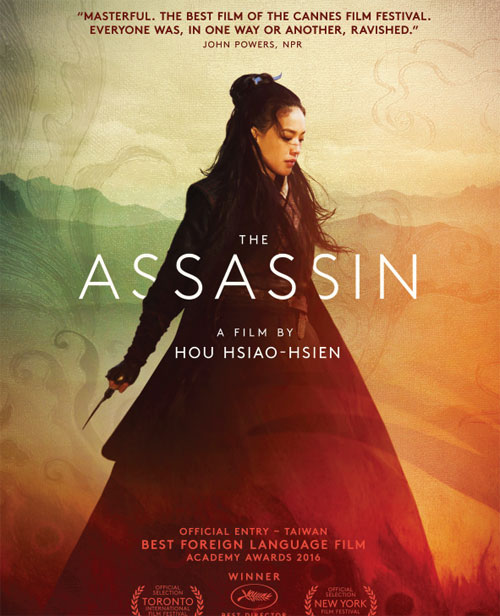Director of The Assassin lets film run course
Updated: 2015-10-08 10:55
By Hong Xiao in New York(China Daily USA)
|
||||||||
|
The poster for the film The Assassin, which will be screened on Oct 16 at the IFC Center and Lincoln Center in New York. Provided to China Daily |
Director Hou Hsiao-Hsien compares his films to a flowing river.
"If my film is a river, or more exactly a torrent, I' m more interested in the course it takes, its speed, its detours, its whirls and eddies, than I am in its source or where it reaches the sea," Hou said.
Hou practically fulfilled this description in his newest film The Assassin, which won him the award for Best Director at the Cannes Film Festival in May and was selected the Best Foreign Language Film at the 88th Academy Awards.
It will be screened on Oct 16 at the IFC Center and the Film Society of Lincoln Center in New York and later in other major US cities and in Canada.
For those familiar with Hou's movies, the extended-sequence shots employed in his story narration, which make his movies like a gently flowing river with power underneath, have become an exclusive feature.
Flowers of Shanghai (1998) is a 113-minute film that contains only about 30 shots.
In The Assassin, that effect has been emphasized.
"I like extended-sequence shots, which show what' s going on behind the characters, the objects that are around them, even the landscapes," Hou explained.
"Extended sequence-shots let the film go further, always further. One shot, encapsulating everything that's going on," Hou added.
The film is set in ninth-century China toward the end of the Tang Dynasty (618-907AD). A young girl is abducted from the family of a decorated general and raised by a nun, who trains her in the martial arts.
After 13 years in exile, she is returned to the land of her birth as an exceptional assassin, with orders to kill her former betrothed. However, her emotions lead her to defy her mistress and discover a new source of strength.
As his first wuxia (martial arts) film, Hou said he wanted to realize a wuxia dream he once had like other Chinese boys.
"I wanted to try my hand at the genre one day - but in the realist vein, which suits my temperament," Hou said.
"It's not really my style to have fighters flying through the air or doing pirouettes on the ceiling. I prefer to keep my feet on the ground. The fight scenes in the film refer to those generic traditions, but they are certainly not the core of the drama," Hou explained.
Inspired by the story titled Nie Yinniang from the Tang Dynasty story collection Chuanqi, The Assassin took seven years of preparation by Hou and his team before shooting commenced, due to his notorious attention to detail.
"The literature of the period is shot through with details of everyday life; you could call it 'realist' in that sense. But I needed more than that for the film, so I spent a long time reading accounts and histories of that period to familiarize myself with the ways people ate, dressed and so on," Hou said.
"For example, there were different ways of taking a bath, depending on whether you were a wealthy merchant, a high official or a peasant," Hou added.
"Tang Dynasty fell in 907, and its empire broke apart," he said. "I just wish I'd been able to Skype the Tang Dynasty directly, so that I could have made the film a great deal closer to the historical truth," Hou joked.
Shu Qi, who plays Nie Yinniang, worked with Hou before in Millennium Mambo (2001) and Three Times (2005). And Chang Chen, who was also in Three Times, plays the governor Tian Ji'an.
"They're my dream actors, and individuals of great quality. What I'm getting at is that I like the way they behave off screen," Hou said.
"I'm not the kind of director who needs to be up close with his actors, maneuvering them and whispering in their ears," Hou joked. "Obviously they have to read the script, but once they come on set, I let them do it their own way," Hou said.
"My job is to accept whatever happens in a scene and, if possible, to capture the best of it," Hou added.
Shooting for The Assassin began in September 2012. Hou and his crew filmed the exteriors in Inner Mongolia, in Northeast China and in Hubei province.
"I was blown away when I saw those silver birch forests and lakes: it was like being transported into a Chinese classical painting. Water and mountains, evoked in a single brushstroke - but not a fantasy, an actual splendor, unspoiled, at least for now," Hou said.
"What I wanted to show with those 'picturesque' shots of the landscapes was how the human presence fits into such overwhelmingly beautiful places. The peasants you see in those shots are real peasants who behaved on film exactly as they do in real life," Hou said.
"As I said before, it's my method as a director: I let happen whatever happens," Hou added.
xiaohong@ chinadailyusa.com
- Robot monk with artificial intelligence makes debut
- Nursing homes, more Chinese old people's final choices
- Hit-and-run luxury car driver detained in Beijing
- Park officials say glass cracks don't affect walkway's safety
- China becomes smaller for tourists
- Scenic spots packed with tourists on National Day Holiday

 Taking a peek
Taking a peek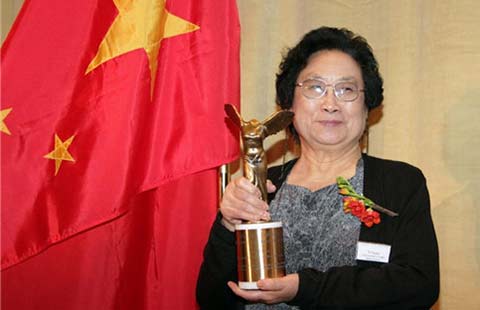
 News you don't wanna miss over the National Day holiday
News you don't wanna miss over the National Day holiday
 TCM knacks to fight post-holiday syndrome
TCM knacks to fight post-holiday syndrome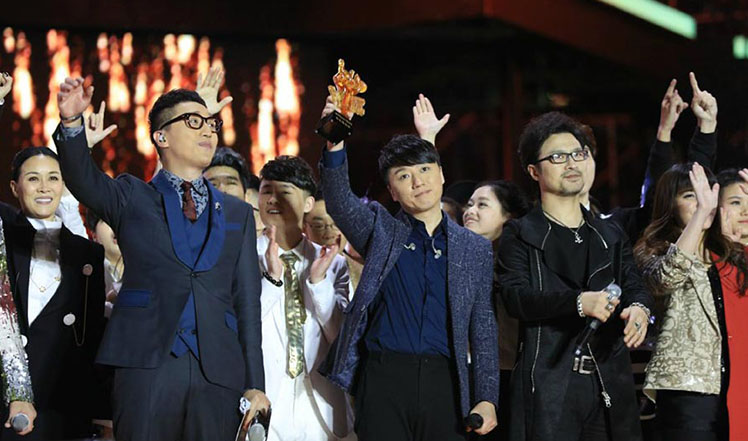
 Zhang Lei wins fourth season of Voice of China
Zhang Lei wins fourth season of Voice of China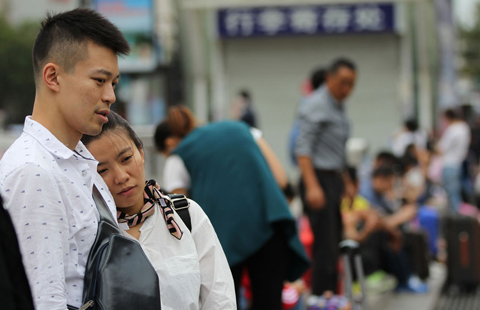
 Travel rush around China as National Day holidays end
Travel rush around China as National Day holidays end-
 Rising yuan use may lift IMF basket prospects
Rising yuan use may lift IMF basket prospects 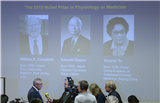
 China wins first Nobel in medicine
China wins first Nobel in medicine-
 Gary Locke: Candor key to relations
Gary Locke: Candor key to relations
Most Viewed
Editor's Picks

|

|

|

|

|

|
Today's Top News
Tu first Chinese to win Nobel Prize in Medicine
Huntsman says Sino-US relationship needs common goals
Xi pledges $2 billion to help developing countries
Young people from US look forward to Xi's state visit: Survey
US to accept more refugees than planned
Li calls on State-owned firms to tap more global markets
Apple's iOS App Store suffers first major attack
Japan enacts new security laws to overturn postwar pacifism
US Weekly

|

|
